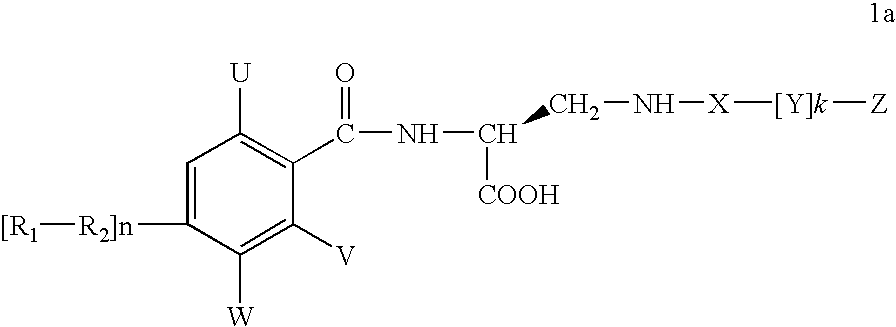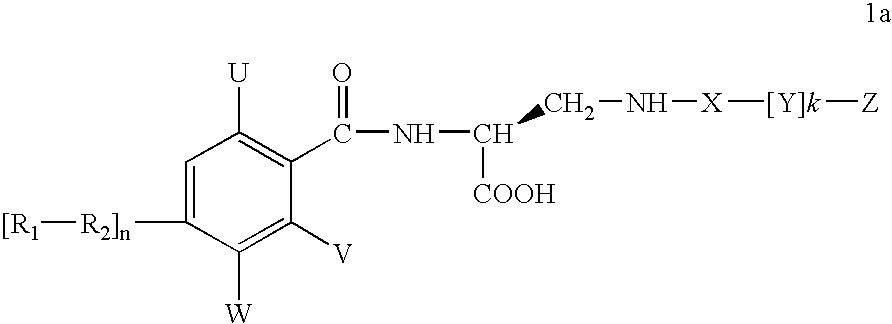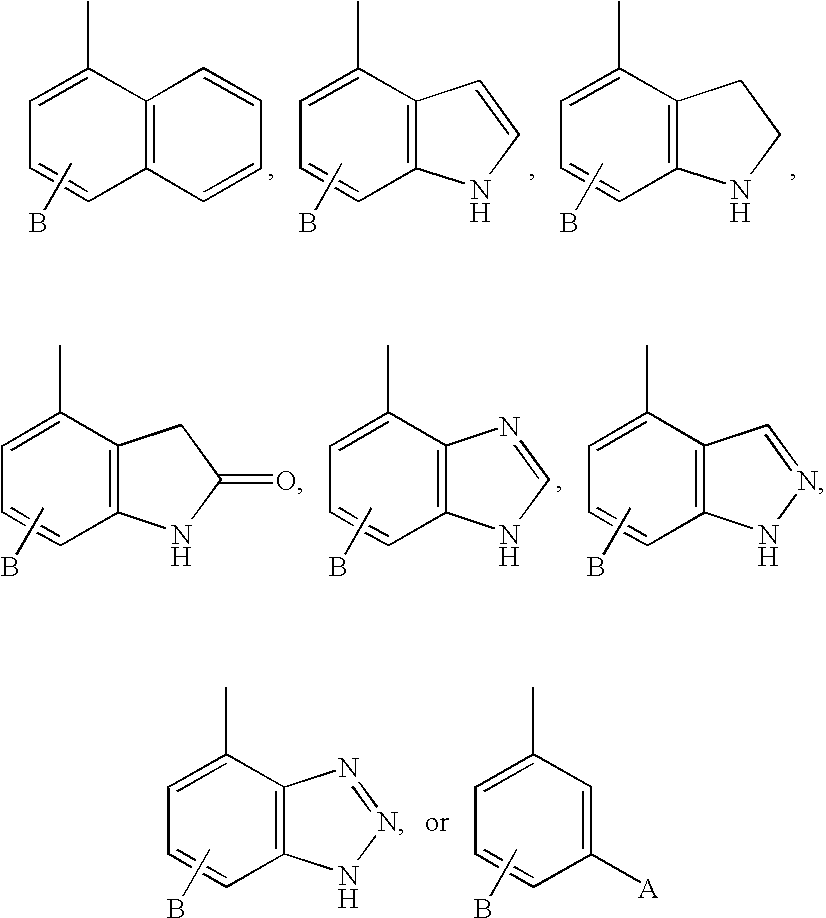Diaminopropionic acid derivatives
a technology of diaminopropionic acid and derivatives, which is applied in the direction of peptides, drug compositions, cardiovascular disorders, etc., can solve the problems of ischemic tissue damage, ischemic tissue damage, and ischemic tissue damage, and achieve the effect of being particularly useful in treatmen
- Summary
- Abstract
- Description
- Claims
- Application Information
AI Technical Summary
Benefits of technology
Problems solved by technology
Method used
Image
Examples
example 1
Preparation of 2-chloro-1,4-benzenedicarboxylic acid, 1-methyl ester
[0472]
[0473] To a 2 L round-bottom flask, equipped with a mechanical stirrer, was charged 2-chloro-1,4-benzenedicarboxylic acid, dimethyl ester (25.15 g, 0.11 mol), methanol (300 mL) and tetrahydrofuran (300 mL). Over 10 min, a solution of lithium hydroxide monohydrate (4.62 g, 0.11 mol) in deionized water (200 mL) was added. After the reaction had proceeded at ambient temperature overnight, the solution was concentrated in vacuo to about 150 mL and then diluted with of deionized water (200 mL). The precipitated solid was filtered off, and washed with deionized water (2×20 mL) to give the starting 2-chloro-1,4-benzenedicarboxylic acid, dimethyl ester (1.8 g) as shiny platelets. The combined filtrates were stirred while 1N hydrochloric acid (112 mL, 0.112 mol) was added. The resulting solid was filtered off, washed with deionized water (2×50 mL) and air dried. The solid was dissolved in methanol (300 mL) and warmed t...
example 2
Preparation of 2-bromo-1,4-benzenedicarboxylic acid, 1-methyl ester
[0474]
[0475] Potassium hydroxide (2.87 g, 51 mmol) was added to a solution of 2-bromo-1,4-benzenedicarboxylic acid, dimethyl ester (14 g, 51 mmol) in methanol (50 mL) at 25° C. The reaction mixture was stirred at 25° C. for 24 h, and then at 50° C. for 3 h. The solvent was concentrated under reduced pressure and the residue was diluted with water (100 mL) and extracted with ethyl acetate (2×200 mL). The water layer was acidified to pH 2 with 2 M HCl and extracted with ethyl acetate (2×200 mL). The combined organic layers were washed with brine (100 mL), dried (MgSO4), filtered, and concentrated. The resulting solid was boiled in toluene (100 mL) and the insolubles were filtered. The filtrate was concentrated and the resulting solid was flash chromatographed (silica, 50% ethyl acetate in petroleum ether with 1% acetic acid) to give 2-bromo-1,4-benzenedicarboxylic acid, 1-methyl ester (3.28 g, 24%) as a white solid.
example 3
Preparation of 2-methylbenzene-1,4-dicarboxylic acid 1-methyl ester
[0476]
4-Bromo-2-methylbenzoic acid, methyl ester
[0477] A mixture of 4-bromo-2-methylbenzoic acid (14.77 g, 68.7 mmol) and sulfuric acid (5 mL) in methanol (200 mL) was heated at reflux for 3 h. The solvent was evaporated and dichloromethane (200 mL) was added. The solution was washed with water, 1 M NaOH, and brine (200 mL each), dried (MgSO4), filtered and evaporated to give 4-bromo-2-methylbenzoic acid, methyl ester (12.21 g, 78%) as a colorless liquid.
2-Methylbenzene-1,4-dicarboxylic acid 1-methyl ester
[0478] A mixture of 4-bromo-2-methylbenzoic acid, methyl ester (22.59 g, 98.6 mmol), triethylamine (32.00 g, 316.2 mmol), palladium(II) acetate (0.56 g, 2.5 mmol), bis(diphenylphosphino)propane (1.04 g, 2.5 mmol) and water (32 mL, 1776.3 mmol) in acetonitrile (80 mL) was pressurized to 40 psi with carbon monoxide and the pressure was released. After six such cycles, the bottle was pressurized again and the conten...
PUM
 Login to View More
Login to View More Abstract
Description
Claims
Application Information
 Login to View More
Login to View More - R&D
- Intellectual Property
- Life Sciences
- Materials
- Tech Scout
- Unparalleled Data Quality
- Higher Quality Content
- 60% Fewer Hallucinations
Browse by: Latest US Patents, China's latest patents, Technical Efficacy Thesaurus, Application Domain, Technology Topic, Popular Technical Reports.
© 2025 PatSnap. All rights reserved.Legal|Privacy policy|Modern Slavery Act Transparency Statement|Sitemap|About US| Contact US: help@patsnap.com



